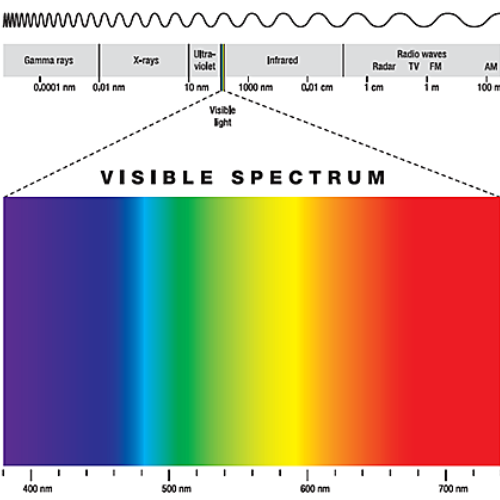
LCD or LED Screen: The Best for the Eyes
These days, choosing a television has become more complicated than it used to be. There are so many TV technology options to choose from, and each one looks equally good.
And then there are the technical terms to know, like LED TV, LCD TV, QLED TV, UHD TV, OLED TV, etc. You might feel like you have to be a tech pro just to watch your favorite TV show at night or enjoy a video game with your friend.
However, confusion arises when deciding whether to opt for an LED or LCD TV screen, especially when you want to be protected from blue light. The two may sound similar in name, but they are very different.
In this article we will explain what blue light is, the difference between the dangers of LED and LCD screens, and which is better for the eyes.
What is Blue Light?

Basking in light is one of our basic needs. It can boost our energy, improve our mood and is important for regulating our circadian rhythm - our natural sleep/wake cycle.
During the long winter months, when sunlight is limited, we always try to find ways to get more light.
But too much light at the wrong time can be harmful. Specifically, we need darkness to sleep. Too much blue light from computers, TVs, mobile phones and so many others can cause eye strain and disrupt our natural rhythms.
Sunlight contains visible and invisible ultraviolet light rays. The visible light rays are of different colors - red, orange, yellow, green and blue - which have varying wavelengths and emit varying amounts of energy.
Warmer colored light rays with relatively long wavelengths contain less energy, and cooler colors with short wavelengths have more energy.

Rays at the blue end of the spectrum have shorter wavelengths and more energy.
Blue light is the closest to invisible light. Ultraviolet light has a particularly short wavelength and is known to be dangerous.
It can burn your skin in the form of sunburn and lead to cancer.
Ultraviolet light can also burn your eyes, especially the cornea, and lead to eye diseases such as age-related degeneration (AMD) or cataract formation.
Faced with these various dangers, it is reasonable to want to protect yourself effectively and limit potential health risks. Therefore, when buying a new television, the amount of blue light transmitted by your screen becomes an important factor.
So let's compare LED screens with LCD screens to see which is better for the eyes, and therefore which is the natural choice.
LCD or LED Screen: The Best for the Eyes
An LED monitor is also an LCD monitor as it also uses a liquid crystal display. However, in this specific type of monitor, the backlighting is composed of light-emitting diodes instead of fluorescent lamps. You can think of LEDs as a series of tiny light bulbs.
Most LED displays have edge lighting, which means that the LEDs are placed on the edge of the screen.
LED monitors are energy efficient and generally last longer than LCD monitors. They are also thinner and lighter, perfect for saving space.
The overall image quality of an LED monitor is also superior. The production of true black contrast is a problem with LCDs due to the type of backlighting, but LED displays greatly reduce this problem.
LED displays also have a fast refresh rate and low lag, making them ideal for gamers. In addition, unlike older LCD monitors, you'll be able to stream 4K content.
Also, it's worth noting that some US and European scientists warn that LED lights could do more harm than good:
A 2019 report from ANSES (French Agency for Food, Environmental and Occupational Health Safety) warned of the "phototoxic effects" of blue light exposure, including an increased risk of age-related macular degeneration.
Should you buy an LCD or LED screen?

Unless budget is your main concern, there is no reason to choose an LCD screen over an LED screen, as LEDs are superior in almost every way.
Although the initial price of an LED screen is higher, it is more energy efficient and has a longer lifespan. You will save money in the long run, making it a much better investment than an LCD screen.
Although LED screens may be slightly more harmful to your eyes, there are several solutions to protect yourself from blue light, including so-called blue light blocking glasses.
Blue Light Blocking Glasses

Whether you have an LED, LCD or any other type of screen, you'll find a real use for blue light blocking glasses.
If you spend a lot of time in front of your screen, especially at night, blue light can potentially disrupt your circadian rhythm.
If you use a smartphone, tablet or computer, the amount of blue light emitted from your smartphone or computer could potentially cause eye strain, discomfort and headaches. Blue light glasses can reduce these effects
Outdoors: Sunlight is another natural source of blue light that can affect your eyes. Blue light blocking glasses can even protect you from some of the sun's blue light.
Indoors: It's not just smartphones, tablets or computers.
As mentioned above, your TVs and therefore your LED and LCD screens and lamps also emit blue light that can affect your eyes.
To minimise exposure, wear light-blocking glasses when watching TV or playing video games, especially at night.
Some studies show that blue light filtering glasses (otherwise known as gaming glasses) are effective in protecting your eyes from blue light that can damage your retina.
At GMG Performance, we offer the best solution for your eyes, especially if you spend a lot of time in front of your screens, LED, LCD or otherwise.


